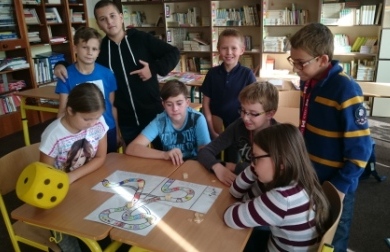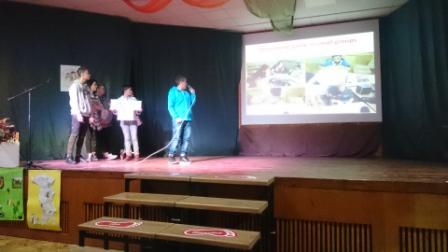Games created for project Teaching: An effective key to self-learning
Our team prepared two games for the 4th meeting in Sevlievo. We described the whole procedure from the first ideas to the product and playing the game with pupils in our presentations.
MONKEY QUEST game
This game rules reminds the well-known game Earthworms and ladders but there are more rules to make it more exciting. It took us a long time to create this game because first we wanted to be really creative and come wiht something brand new. But we had no idea what to do. So both classes 8. A and 8. B had brainstorming in small groups and each group made suggestion of their own game and a simple model. Next, each group presented their game to the class. We must admit that all groups used already existing games as a temple and added more rules or changed some rules and made their original graphics and playing pins. After the presentations our team voted and chose our Ámal´s team suggestion. Then our team worked on the rules and graphics. Next, we made our playing pins from wood, and Michal finished them at home. Finally, we put our playing board in plastic and we were ready for try outs. We started in our school club with six pupils aged 9 years. We found out that we have so many rules that even our team is able to forgert some, so there are simpler and advance versions of the rules now. We were pleased to learn that the pupils continued playing the game after Michal and Ámal had to go to another lesson and it is the best prove that pupils enjoyed our game. Next time we played the game in class 3. B. We are sad that we did not play our game during the meeting in Sevlievo with the other countries but we were shy to organize it and we also wanted to play other teams´ games.
 |
|
 |
COBWEBS game
Our team decided to make another game based on school curriculum for Maths in grade 2 because during the third meeting in Desio, Italy, we were teaching Maths based on this curriculum. Our school uses Mr. Hejny´s methodology which develops logical thinking through visual learning and discovering maths laws. Michal´s brother attends class 2 and also other members of our team were interested in the new method. So first we studied their textbooks and then we chose problem called "cobweb". Children must find out what is the value of each coloured arrow and fill numbers in each circle. We actually copied the cobwebs from the textbook, put them in plastic and then we cut from wood lots of little squares and wrote numbers on them. Now pupils do not have erase their paper when they are mistaken because they can easily removed the squares with numbers. We wanted to help to pupils who are struggling with Math. First try out was performed at Michal´s home with his brother and his friends. Then we try this game with pupils from class 2. C who were struggling with these kind of tasks. First the children needed some time to find out how to make the best from using the wooden squares instead of writing. At the end of the lesson they were able to solve their tasks easily.
Here you can see boys helping Michal with the game. They are using Smartnotebook to draw the task plans which you can see on the right. The preparation of the game from the beginning to the try outs is described in the presentation which we showed to our friends during the Bulgarian meeting in Sevlievo in October 2016.
TRIVIAL game
For the last meeting we were given a task to prepare 40 question about the Czech Republic and 40 questions from Biology. Our team really struggled with this task so we asked for help all pupils from grade 7 and 8 who did not take part in a 14 day-stay in school in the mountains. They worked in three teams on questions about the Czech Republic and each prepared their set of questions. Then we simply compared their questions and used those which were repeated. Finally we had to create 5 last questions about the Czech Republic. With the Biology questions we did not know how to start because the knowledge of specific words in English is limited. Finally, we decided to make questions about the fastest, biggest, heaviest, smallest animals, birds, fish or plants. And we added two questions about photosynthesis. Our questions from Biology were used in English lesson for practisig superlatives of adjectives in class 6. A and we implemented our questions into P. E. lesson which we prepared for teaching in Belgium school.
The other teams prepared questions about their country, chemistry, maths, astronomy, geography. Belgium team prepared the templates for the questions, rules, the playing board, and pins. During the meeting in Sint Niklaas they explained to us how to play it and then we had an hour to play in six groups. In each group was a representative of each country. The game took too long and we had a meeting with the town mayor in the city hall, so nobody finished it. It is OK, all of us were winners!
Here are our questions about the Czech Republic and Biology, correct answer is written in bold.

